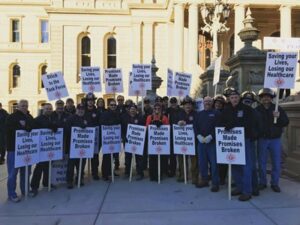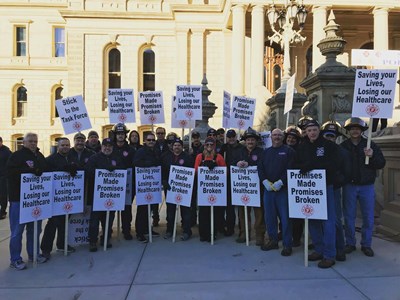 After a year-long fight against anti-labor legislation, the Michigan Professional Fire Fighters Union (MPFFU) and a coalition of other labor groups successfully lobbied for the passage of positive reform of retiree pensions and healthcare plans. These reforms will help the municipal-based pension and retiree healthcare systems work toward fiscal solvency.
After a year-long fight against anti-labor legislation, the Michigan Professional Fire Fighters Union (MPFFU) and a coalition of other labor groups successfully lobbied for the passage of positive reform of retiree pensions and healthcare plans. These reforms will help the municipal-based pension and retiree healthcare systems work toward fiscal solvency.
“The MPFFU, with assistance from the IAFF, has come away from this fight with a huge victory,” says 8th District Vice President Mark Sanders. “Not only were we able to beat back the attacks on labor, MPFFU President Mark Docherty, Secretary-Treasurer Terry Chesney and the entire MPFFU Executive Board were able to replace bad bills with legislation benefiting all Michigan retirees.”
“I am very proud of all of the hard work our Executive Board and our members did to win this battle,” says MPFFU President Docherty. “With the help of the IAFF, we were able to devise a winning strategy and walk away with a bill that calls for the reform we wanted.”
At issue is the combined $7.4 billion in unfunded pension liabilities (from 800 plans) and $10.3 billion in unfunded retiree health care benefits (from 300 plans).
In September 2016, lobbyist Dick DeVos, husband of U.S. Secretary of Education Betsy DeVos, announced plans to push reform that would eliminate traditional retiree health care coverage in favor of tax-deferred health savings accounts and require current workers and retirees to pay 20 percent more in health insurance premiums. While he is not a legislator, DeVos holds a lot of sway with state Republicans because his family is the largest contributor to their campaigns.
Legislation reflecting DeVos’s goals was proposed, and the MPFFU launched a campaign to explain the pitfalls of the legislation and the harm it would do to all Michigan workers. The campaign reached its peak when the MPFFU held a rally on the steps of the state capitol.
Not only did the state legislature pull the proposed reform, Governor Rick Snyder formed the Responsible Retirement Reform for Local Government Task Force with a mission to identify better ways to help pensions and retiree health care plans become more fiscally solvent.
The task force, which included representation from the MPFFU, released a report in July 2017 listing recommended solutions, including: requiring local governments to report funding of pension and retiree health care plans to the state, the state treasury department to evaluate the plans to determine which are underfunded and give waivers to communities with under-funded pensions if communities can provide a plan to refill the fund, and the state to create a Municipal Stability Board to assist communities in creating a plan to improve struggling pensions and retiree health care plans.
But rather than creating legislation to reflect the task force recommendations, state leaders wanted to pass reform to allow the state to make changes to communities’ struggling pensions and retiree health benefits regardless of whether the changes violated existing union contracts.
“We agreed that reform was needed to improve the fiscal health of our pensions and retiree health plans, but we believed the task force recommendations were the best way to go,” says Docherty. “This was overreach.”
Determined to protect collective bargaining rights and retiree benefits, the MPFFU worked with the IAFF to create a strategy to put pressure on state legislators, which included a rally at the state capitol and the presence of between 100 and 200 fire fighters at the capitol each day following the rally.
Buckling under pressure, legislators pulled the bills and replaced them with legislation that reflected the task force recommendations. The replacements have been approved by both the state house and senate.



